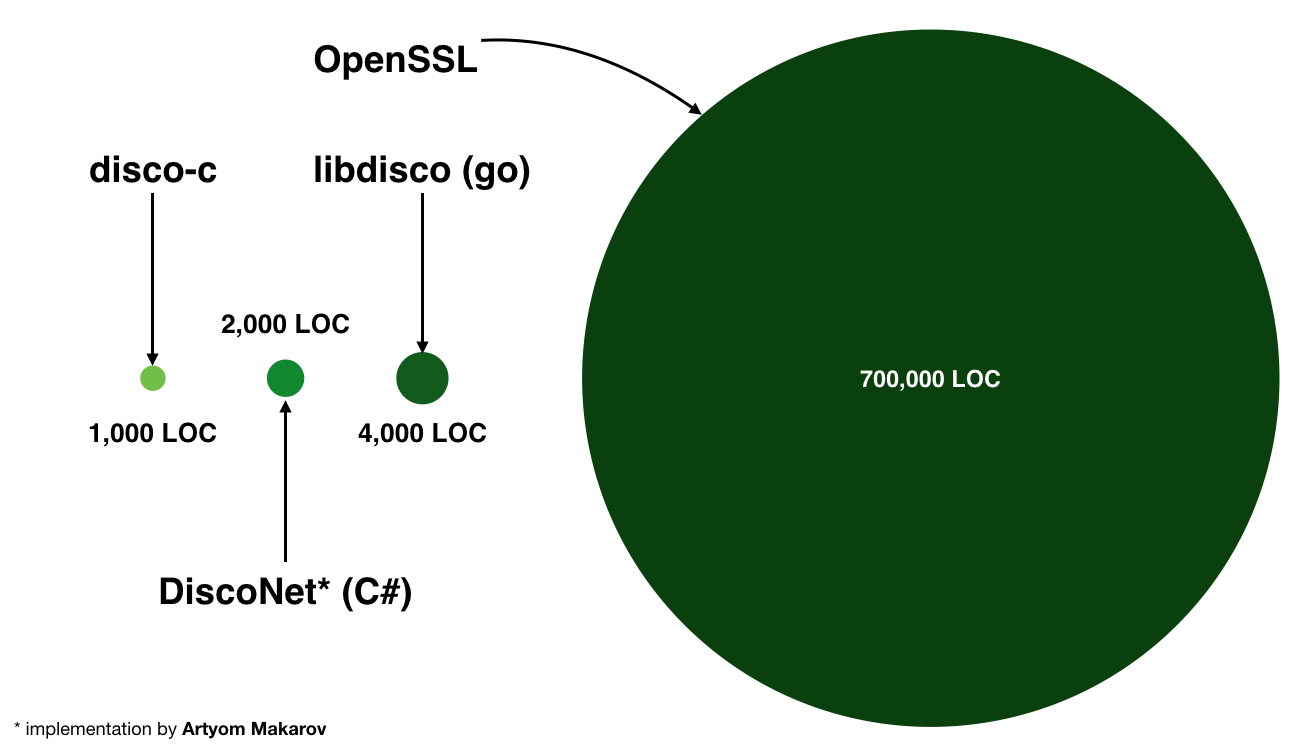EmbeddedDisco is a modern protocol and a cryptographic library in C. It offers different ways of encrypting communications, as well as different cryptographic primitives for all of an application's needs. It targets simplicity, security and portability, with around 1000 lines-of-code, not a single malloc and a design based solely on the well-accepted SHA-3 and Curve25519 cryptographic primitives. It's for embedded devices, automotive chips, etc.
This repository is light on detail as it is actively under developement. To have a more gentle introduction, check this blogpost. The state of this library is quite experimental. Please do not use it in production. A more mature implementation of Disco exists in Go. More implementations are listed here.
In order to make this library more stable I need your help. Play with the library, contact me here, provide feedback, post issues :) I'm happy to help.
Here's how you setup a server with the IK handshake (the server's identity is known to the client; the client advertises it's identity during the handshake):
#include "disco_asymmetric.h"
#include <stdio.h>
int main() {
// generate long-term static keypair
keyPair server_keypair;
disco_generateKeyPair(&server_keypair);
// initialize disco for the Noise IK handshake pattern
handshakeState hs_server;
disco_Initialize(&hs_server, HANDSHAKE_IK, false, NULL, 0, &server_keypair,
NULL, NULL, NULL);
// process the first handshake message → e, es, s, ss
uint8_t in[500];
size_t in_len
bool ret = disco_ReadMessage(&hs_server, out, out_len, in, &in_len, NULL, NULL);
if (!ret) {
abort();
}
// validate the client's identity via a whitelist or a public key infrastructure
// or trust-on-first-use, etc.
// create second handshake message ← e, ee, se
strobe_s s_write;
strobe_s s_read;
size_t out_len;
ret = disco_WriteMessage(&hs_server, (uint8_t *)"second payload", 15,
out, &out_len, &s_read, &s_write);
if (!ret) {
abort();
}
// send `out` of size `out_len` to the client...
// should be initialized
assert(s_write.initialized && s_read.initialized);
// decrypt
if (disco_DecryptInPlace(&s_read, ciphertext, ciphertext_len) ==
false) {
abort();
}
// send `ciphertext` of size `ciphertext_len - 16` to the client...
}Here's how you setup a client:
#include "disco_asymmetric.h"
#include <stdio.h>
int main() {
// generate long-term client keypair
keyPair client_keypair;
disco_generateKeyPair(&client_keypair);
// obtain server's key somehow...
keyPair server_keypair;
server_keypair.pub = {0x01, 0x01, 0x01, 0x01, 0x01, 0x01, 0x01, 0x01, 0x01,
0x01, 0x01, 0x01, 0x01, 0x01, 0x01, 0x01, 0x01, 0x01,
0x01, 0x01, 0x01, 0x01, 0x01, 0x01, 0x01, 0x01, 0x01,
0x01, 0x01, 0x01, 0x01, 0x01, 0x01, 0x01, 0x01};
// initialize disco
handshakeState hs_client;
disco_Initialize(&hs_client, HANDSHAKE_IK, true, NULL, 0, &client_keypair,
NULL, &server_keypair, NULL);
// write the first handshake message → e, es, s, ss
uint8_t out[500];
size_t out_len;
bool ret =
disco_WriteMessage(&hs_client, (uint8_t*)"hey!", 5, out, &out_len, NULL, NULL);
if (!ret) {
abort();
}
// process second handshake message ← e, ee, se
strobe_s c_write;
strobe_s c_read;
size_t in_len;
ret =
disco_ReadMessage(&hs_client, out, out_len, in, &in_len, &c_write, &c_read);
if (!ret) {
abort();
}
// payload `in` of size `in_len` has been received
// should be initialized
assert(c_write.initialized && c_read.initialized);
// send a post-handshake message
uint8_t plaintext[] = "just a simple message";
uint8_t* ciphertext = (uint8_t*)malloc(sizeof(plaintext) + 16);
memcpy(ciphertext, plaintext, sizeof(plaintext));
disco_EncryptInPlace(&c_write, ciphertext, sizeof(plaintext),
sizeof(plaintext) + 16);
// send the `ciphertext` of size `size(plaintext)+16`
}To use the symmetric parts of the library, simply include disco_symmetric.h:
#include "disco_symmetric.h"
int main() {
uint8_t input[10] = {0, 1, 2, 3, 4, 5, 6, 7, 8, 9};
uint8_t out[32];
// here is how we hash something
disco_Hash(input, 10, out, 32);
}Check the documentation here.
This library is still heavily experimental. Its goal is to support as many platforms as possible. If you need help making it work for a specific platform please post an issue. If you have feedback, or suggestions, please post an issue as well.
